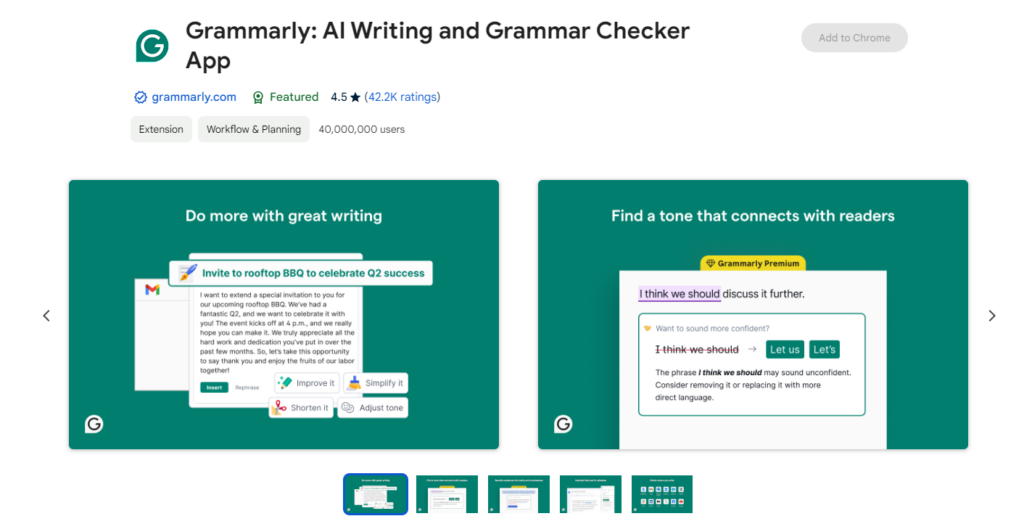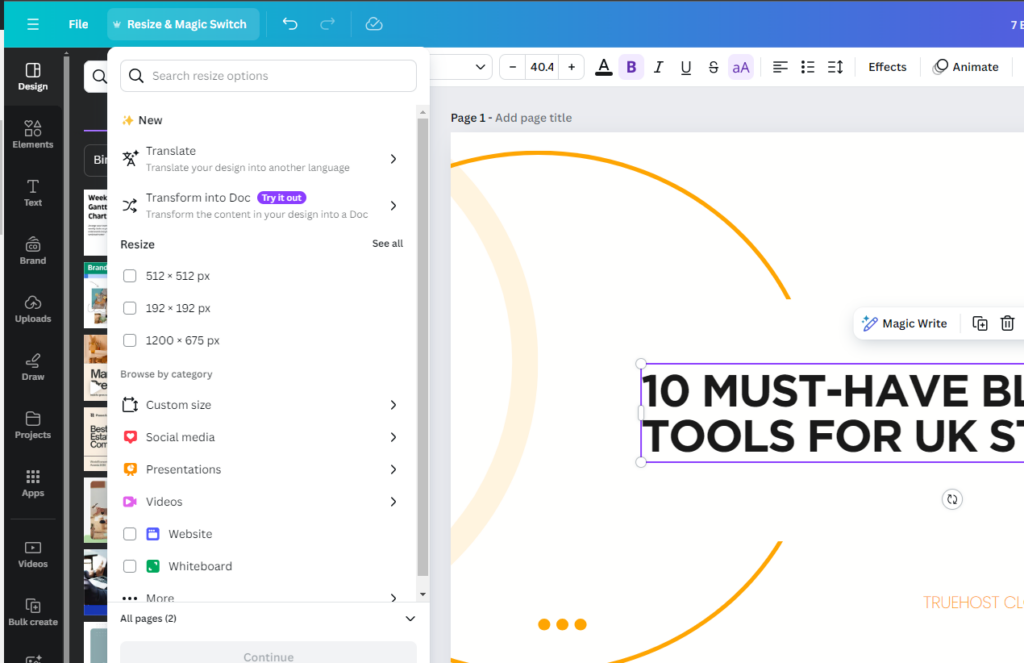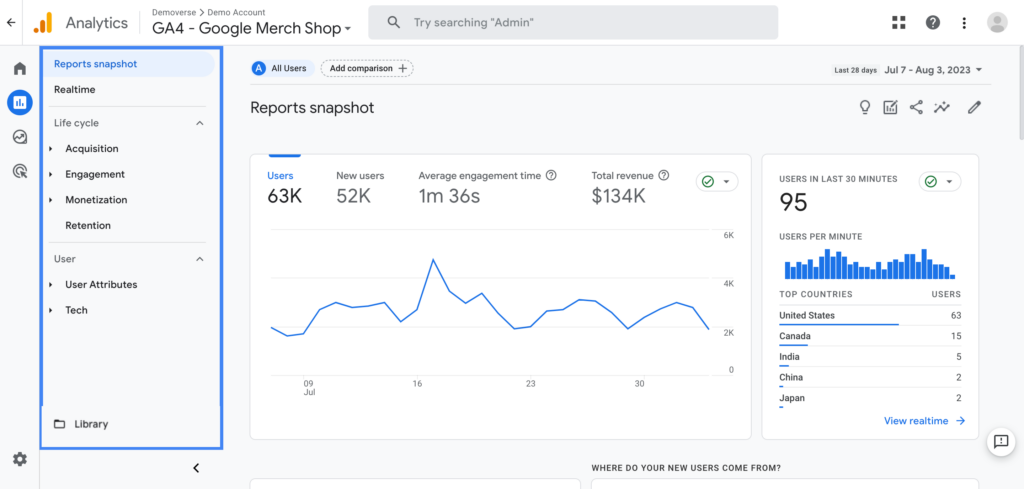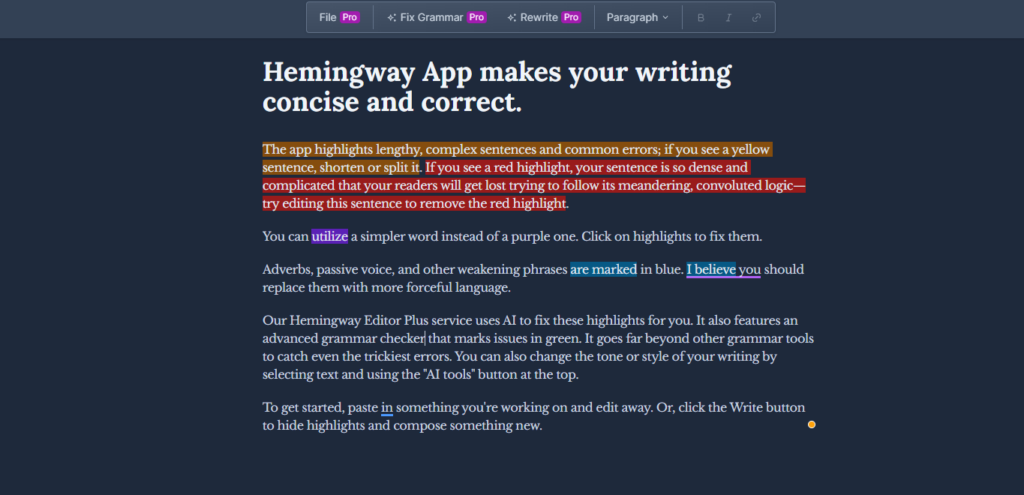Last updated on August 17th, 2024 at 04:28 am
As a student, you’re probably juggling coursework, part-time jobs, and a social life.
But have you considered adding blogging to your repertoire?
Trust me, it’s not just another task to add to your already packed schedule.
Blogging can be your secret weapon for academic success, career advancement, and personal growth.
But here’s the kicker: to really make your mark in the blogosphere, you need the right tools.
And that’s exactly what we’re diving into today – the best blogging tools for UK students.
These aren’t just any tools.
These are the game-changers, the secret sauce that’ll take your blog from a basic online diary to a powerful platform for your ideas and expertise.
So, buckle up.
We’re about to embark on a journey through the digital landscape, exploring the ten must-have blogging tools that’ll supercharge your online presence.
Whether you’re a fresher just dipping your toes into the blogging world or a final-year student looking to leave a lasting digital footprint, this guide is for you.
Let’s get started, shall we?
Criteria for Selecting the Best Blogging Tools
Before we get into our list of the best blogging tools for UK students, let’s talk about how we’ve curated this list.
After all, not all tools are created equal, and what works for a Silicon Valley tech guru might not cut it for a busy student in Manchester or Edinburgh.
Here’s what we looked for:
- Ease of Use: You’re a student, not a full-time blogger. You need tools that are intuitive and don’t require a computer science degree to figure out.
- Affordability: Let’s face it, student budgets are tight. We’ve focused on tools that offer free versions or student discounts.
- Relevance to UK Student Needs: We’ve considered the unique needs of UK students, from academic writing styles to UK-specific SEO.
- Integration: The best tools play well with others. We’ve prioritized tools that can easily integrate with other platforms you might be using.
- Mobile Friendliness: Because let’s be honest, a lot of your blogging might happen on your phone between lectures or on the bus.
By sticking to these criteria, we’ve ensured that our list of the best blogging tools for UK students is truly tailored to your needs.
These aren’t just popular tools; they’re tools that will genuinely make your blogging life easier and more productive.
So, without further ado, let’s dive into our top 10 picks!
1. WordPress: The Foundation of Your Blogging Empire

When it comes to the best blogging tools for UK students, WordPress is the undisputed king of the hill.
It’s like the Swiss Army knife of blogging platforms – versatile, powerful, and essential.
Why WordPress, you ask? Let me break it down for you:
Flexibility: WordPress is like clay in your hands. You can mold it into anything you want. A simple personal blog? Check. A portfolio to showcase your work? Absolutely. A platform for your student organization? No problem.
Ease of Use: Don’t let its power fool you. WordPress is surprisingly easy to use, even for beginners. Its intuitive interface means you can focus on creating content, not wrestling with tech.
Huge Community: With WordPress, you’re never alone. There’s a massive community of users and developers ready to help you out. Stuck on something? A quick Google search will likely solve your problem.
Plugins Galore: Want to add a contact form? There’s a plugin for that. Need to optimize your site for SEO? There’s a plugin for that too. WordPress’s extensive plugin library lets you add functionality to your site with just a few clicks.
Here’s a quick list of why WordPress is a no-brainer for UK students:
- Free to use (hosting costs aside)
- Highly customizable
- Scalable as your blog grows
- Great for SEO
- Supports multiple authors (perfect for group projects)
But here’s the real kicker: WordPress skills are highly valuable in the job market.
By mastering WordPress, you’re not just building a blog – you’re developing a skill set that can open doors in your future career.
Pro Tip: Start with WordPress.com for a free, hosted solution. As you grow more comfortable and your needs evolve, you can easily migrate to a self-hosted WordPress.org site for more control and customization.

Remember, your blog is your digital real estate.
And just like in the real world, location matters.
With WordPress, you’re setting up shop on prime digital property.
2. Grammarly: Your Personal Writing Coach

Next up on our list of best blogging tools for UK students is Grammarly.
If WordPress is the foundation of your blogging house, think of Grammarly as your ever-vigilant editor, catching typos and grammatical faux pas before they see the light of day.
Let’s face it: nothing undermines your credibility faster than a post riddled with spelling mistakes and grammatical errors.
As a UK student, you’re held to a high standard of written English.
Grammarly helps you meet and exceed that standard.
Here’s why Grammarly is a must-have:
Real-Time Corrections: Grammarly works as you type, flagging errors and suggesting improvements on the fly. It’s like having a tutor looking over your shoulder, but without the awkwardness.
Contextual Suggestions: It doesn’t just catch typos; it understands context. It can suggest more impactful words or clearer sentence structures, helping you refine your writing style.
Plagiarism Checker: This feature is a lifesaver for academic bloggers. It ensures your content is original, helping you avoid accidental plagiarism.
Tone Detector: Not sure if your writing comes across as formal, friendly, or somewhere in between? Grammarly’s tone detector has got you covered.
Here’s a quick breakdown of Grammarly’s benefits:
- Improves writing clarity and impact
- Helps maintain a consistent tone
- Works across multiple platforms (browser, Word, Google Docs)
- Offers a free version with robust features
But here’s the real value for UK students: Grammarly adapts to British English.
No more awkward moments where your spell-checker tries to Americanize your perfectly good British spelling.
Pro Tip: Use Grammarly’s browser extension for seamless integration across all your online writing platforms.

Remember, good writing is good thinking made visible.
With Grammarly, you’re not just correcting errors; you’re honing your communication skills – a crucial asset for any student or professional.
3. Canva: Design Like a Pro (Even If You’re Not)

Moving on in our exploration of the best blogging tools for UK students, let’s talk about Canva.
In today’s visually-driven online world, your blog needs to look as good as it reads.
Enter Canva – your secret weapon for creating stunning visuals without a design degree.
Why is Canva a game-changer for student bloggers? Let’s break it down:
User-Friendly Interface: Canva’s drag-and-drop interface is intuitive enough for even the most design-challenged among us. No need to fumble with complex design software.
Templates Galore: From blog headers to infographics, Canva offers a wealth of pre-designed templates. Just pick one, customize it, and voila – you’ve got professional-looking graphics in minutes.
Brand Kit: Consistency is key in blogging. Canva’s Brand Kit feature lets you save your blog’s colors, fonts, and logos for easy access. It’s like having your own personal brand manager.
Collaboration Features: Working on a group blog for your course? Canva’s team features make collaboration a breeze.
Here’s a quick list of what you can create with Canva:
- Blog posts featured images
- Social media graphics
- Infographics
- Presentations
- YouTube thumbnails
But here’s the kicker for UK students: Canva offers a free plan for students.
Just sign up with your .ac.uk email address, and you’ll get access to premium features at no cost.
Pro Tip: Use Canva’s ‘Magic Resize’ feature to quickly adapt your designs for different social media platforms. It’s a time-saver when you’re promoting your blog across multiple channels.

Remember, in the world of blogging, first impressions matter.
With Canva, you’re ensuring that your blog’s visual appeal matches the quality of your content.
4. Google Analytics: Know Your Audience Inside Out

As we continue our journey through the best blogging tools for UK students, we can’t overlook the power of data.
Enter Google Analytics – your window into the soul of your blog’s audience.
Now, I know what you’re thinking. “Analytics? Sounds boring and complicated.”
But trust me, once you start using Google Analytics, you’ll wonder how you ever blogged without it.
Here’s why Google Analytics is a must-have:
Audience Insights: Want to know where your readers are coming from? What devices they’re using? How long they’re staying on your site? Google Analytics has all these answers and more.
Content Performance: Find out which of your posts are hitting the mark and which are falling flat. This insight is gold for refining your content strategy.
Goal Tracking: Set up goals (like newsletter sign-ups or ebook downloads) and track how well you’re achieving them.
Real-Time Data: See who’s on your site right now. It’s oddly addictive and incredibly useful for monitoring the immediate impact of your promotional efforts.
Here’s a quick list of key metrics you should keep an eye on:
- Pageviews
- Average time on page
- Bounce rate
- Traffic sources
- User demographics
But here’s the real value for UK students: Google Analytics skills are highly sought after in the job market.
By mastering this tool, you’re not just improving your blog – you’re adding a valuable skill to your CV.
Pro Tip: Set up custom dashboards in Google Analytics to focus on the metrics that matter most to you. It’ll save you time and help you spot trends more easily.

Remember, data without insight is just numbers.
With Google Analytics, you’re turning those numbers into actionable strategies to grow your blog and engage your audience more effectively.
5. Yoast SEO: Your Ticket to Search Engine Stardom

Halfway through our list of the best blogging tools for UK students, we come to a real heavy-hitter: Yoast SEO.
If you want your blog to be more than just a digital diary – if you want it to actually be found and read – you need to get cozy with SEO.
And Yoast SEO is your golden ticket.
Why is Yoast SEO a game-changer? Let’s dive in:
User-Friendly SEO: SEO can be intimidating, but Yoast breaks it down into manageable, actionable steps. It’s like having an SEO expert guiding you through each post.
Real-Time Content Analysis: As you write, Yoast analyzes your content, giving you instant feedback on readability and SEO. It’s like having a co-pilot for your content creation.
Focus Keyword Optimization: Yoast helps you optimize your content around your chosen keywords, increasing your chances of ranking in search results.
Readability Check: Because what’s the point of ranking if your content is a chore to read? Yoast ensures your posts are easy on the eyes (and brain).
Here’s a quick list of Yoast SEO’s key features:
- SEO title and meta description templating
- Content and readability analysis
- Internal linking suggestions
- XML sitemaps
- Social media preview optimization
But here’s the kicker for UK students: Yoast SEO can help you optimize for local UK search terms.
This is crucial if you’re blogging about topics relevant to your university or local area.
Pro Tip: Don’t just focus on the green lights in Yoast. Use it as a guide, but remember to write for humans first, search engines second.
Remember, SEO isn’t about gaming the system.
It’s about making your valuable content more discoverable.
With Yoast SEO, you’re not just throwing your blog into the vast ocean of the internet – you’re giving it a compass and a map.
6. Trello: Organize Your Blogging Life

As we continue our exploration of the best blogging tools for UK students, let’s talk about something that’s often overlooked but absolutely crucial: organization.
Enter Trello – your digital bulletin board for keeping your blogging life in order.
Why is Trello a must-have for student bloggers? Let’s break it down:
Visual Organization: Trello’s card-based system is intuitive and flexible. You can see your entire blogging workflow at a glance.
Collaboration Made Easy: Working on a group blog? Trello makes it simple to assign tasks, share ideas, and track progress.
Customizable Workflows: Whether you prefer Kanban, Scrum, or your own unique system, Trello adapts to your style.
Integration Central: Trello plays well with other tools, from Google Drive to Slack, making it a central hub for your blogging activities.
Here’s a quick list of how you can use Trello for blogging:
- Content calendar
- Idea board
- Editorial workflow
- Task management
- Collaboration hub
But here’s the real value for UK students: Trello can help you balance your blogging with your studies.
Use it to manage both your blog posts and your coursework deadlines in one place.
Pro Tip: Use Trello’s ‘Butler’ feature to automate repetitive tasks. For example, you could set it to automatically move a card to your ‘Review’ list when you add the ‘Draft Complete’ label.
Remember, a disorganized blogger is an inconsistent blogger.
With Trello, you’re not just organizing your tasks – you’re setting yourself up for long-term blogging success.
7. Evernote: Your Digital Brain for Blogging

As we delve deeper into our list of the best blogging tools for UK students, we come to a true Swiss Army knife of productivity: Evernote.
Think of it as your digital brain, capturing and organizing all your blogging ideas and research.
Why is Evernote a game-changer for student bloggers? Let’s unpack it:
Idea Capture: Brilliant blog post idea in the middle of a lecture? Snap a quick note in Evernote. You can add text, images, audio, and even handwritten notes.
Research Organization: Evernote’s web clipper lets you save articles, images, and PDFs from the web, organizing them into notebooks for easy reference.
Cross-Platform Sync: Whether you’re on your laptop, tablet, or phone, your notes are always with you, always in sync.
Powerful Search: With Evernote’s OCR technology, you can even search for text within images. Never lose a scribbled idea again.
Here’s a quick list of how you can use Evernote for blogging:
- Blog post drafting
- Content research
- Inspiration board
- Collaboration with other bloggers
- To-do lists and reminders
But here’s the kicker for UK students: Evernote can be a powerful study aid too.
Use it to organize your course notes alongside your blog ideas, killing two birds with one stone.
Pro Tip: Use Evernote’s templates feature to create a standardized structure for your blog posts. It’ll save you time and ensure consistency across your content.
Remember, your brain is for having ideas, not holding them.
With Evernote, you’re freeing up mental space to focus on what really matters – creating great content for your blog.
8. Hemingway Editor: Write with Clarity and Impact

As we near the end of our list of the best blogging tools for UK students, let’s talk about a tool that can dramatically improve your writing: the Hemingway Editor.
Named after the master of concise prose, Ernest Hemingway, this tool is all about making your writing bold and clear.
Why is the Hemingway Editor a must-have? Let’s break it down:
Readability Focus: The Hemingway Editor analyzes your text and assigns it a readability grade. It’s like having a tutor who’s obsessed with clarity.
Sentence Structure Analysis: It highlights complex sentences, encouraging you to break them down into more digestible chunks.
Passive Voice Detection: Passive voice can make your writing weak. Hemingway helps you catch and correct it.
Adverb Overuse Warning: Too many adverbs can weaken your prose. Hemingway keeps you in check.
Here’s a quick list of what Hemingway helps you improve:
- Sentence length
- Use of active voice
- Word choice simplicity
- Overall readability
Clear, concise writing isn’t just good for blogging.
It’s a skill that will serve you well in your essays, reports, and future professional writing.
Pro Tip: Don’t aim for a perfect score in Hemingway. Use it as a guide, but maintain your unique voice. Sometimes, breaking the rules is what makes your writing stand out.
Remember, in blogging, clarity is king.
With the Hemingway Editor, you’re not just writing; you’re communicating with precision and impact.
9. Buffer: Amplify Your Blog’s Reach

As we approach the end of our list of the best blogging tools for UK students, let’s talk about getting your content out there.
Enter Buffer – your social media scheduling powerhouse.
Why is Buffer a game-changer for student bloggers? Let’s dive in:
Time-Saving Scheduling: Write your social media posts in advance and let Buffer post them at optimal times. It’s like having a personal social media manager.
Multi-Platform Support: From Twitter to LinkedIn, Buffer lets you manage multiple social accounts from one dashboard.
Analytics: See which of your posts are performing best, helping you refine your social media strategy.
Content Suggestions: Running out of ideas? Buffer can suggest relevant content to share with your audience.
Here’s a quick list of what Buffer can do for your blog:
- Schedule posts across multiple platforms
- Analyze post performance
- Suggest optimal posting times
- Provide content ideas
- Collaborate with team members
Buffer’s free plan is quite robust, perfect for those on a student budget.

Plus, managing your blog’s social media efficiently means more time for your studies.
Pro Tip: Use Buffer’s ‘Pablo‘ feature to create eye-catching images for your social media posts. It’s a quick way to make your content stand out in crowded social feeds.

Remember, great content deserves to be seen.
With Buffer, you’re not just hoping for readers to find your blog – you’re actively putting it in front of them.
10. Mailchimp: Nurture Your Blog’s Community

We’ve reached the final tool in our list of the best blogging tools for UK students, and it’s a big one: Mailchimp.
Because blogging isn’t just about writing – it’s about building a community.
Why is Mailchimp essential for student bloggers? Let’s break it down:
Email Marketing Made Easy: Mailchimp simplifies the process of creating and sending newsletters to your blog subscribers.
Audience Segmentation: Target specific groups within your audience with tailored content. It’s like having a conversation, not shouting into the void.
Automation: Set up welcome emails, birthday messages, and more to engage your audience without constant manual work.
Landing Pages: Create simple, effective landing pages to grow your email list or promote your latest blog post.
Here’s a quick list of what Mailchimp offers:
- Email campaign creation and management
- Subscriber list management
- Automated email sequences
- Basic CRM features
- Performance analytics
But here’s the real value for UK students: Mailchimp’s free plan allows up to 2,000 contacts and 10,000 sends per month.
That’s more than enough to get started and grow your blog’s community.
Pro Tip: Use Mailchimp’s A/B testing feature to experiment with different subject lines or content formats. It’s a great way to learn what resonates with your audience.
Remember, your email list is one of your blog’s most valuable assets.
With Mailchimp, you’re not just broadcasting content – you’re fostering relationships with your readers.
Summary of Key Takeaways
We’ve covered a lot of ground in our exploration of the best blogging tools for UK students.
Let’s recap the key points:
- WordPress: Your blogging foundation
- Grammarly: Your personal writing coach
- Canva: Your design superpower
- Google Analytics: Your audience insight tool
- Yoast SEO: Your search engine optimizer
- Trello: Your organizational hub
- Evernote: Your digital brain
- Hemingway Editor: Your clarity enhancer
- Buffer: Your social media manager
- Mailchimp: Your community builder
Remember, these tools are not just for blogging.
They’re developing skills that will serve you well in your academic and professional life.
Here are some tips for implementing these tools effectively:
- Start with the basics: WordPress, Grammarly, and Canva
- As you grow, add tools like Google Analytics and Yoast SEO
- Use Trello and Evernote to stay organized from the start
- Implement Buffer and Mailchimp when you’re ready to grow your audience
The key is to not get overwhelmed.
Start with a few tools and gradually incorporate others as your needs evolve.
Wrap!
And there you have it – the 10 must-have blogging tools for UK students.
These tools aren’t just about making your blogging life easier (although they certainly do that).
They’re about empowering you to create, share, and grow.
Remember, blogging isn’t just a hobby.
It’s a powerful platform for developing your voice, showcasing your expertise, and building a network.
As a UK student, your unique perspective is valuable.
These tools are here to help you share that perspective with the world.
So, what are you waiting for?
Dive in, start experimenting with these tools, and watch your blog (and your skills) grow.
The blogging world is waiting for your voice.
Armed with these best blogging tools for UK students, you’re ready to make your mark.
Read also:
FAQs
Do I need to use all these tools to start blogging?
Not at all! Start with the basics like WordPress, Grammarly, and Canva. Add others as your blog grows and your needs evolve.
Are these tools free for students?
Many of these tools offer free versions or student discounts. Always check for educational pricing or .ac.uk email sign-ups for the best deals.
Can these tools help with my academic writing too?
Absolutely! Tools like Grammarly, Hemingway Editor, and Evernote can be incredibly useful for essays and research papers.
How much time should I spend on blogging as a student?
It varies, but start small. Even 2-3 hours a week can be enough to maintain a consistent blog. Use tools like Trello and Buffer to manage your time efficiently.
Is it worth investing in premium versions of these tools?
As a student, start with free versions. Consider upgrading only when you’ve outgrown the free features and can justify the expense based on your blog’s growth.
Can blogging help my career prospects?
Definitely! Blogging showcases your writing skills, subject expertise, and digital literacy – all valuable to potential employers.
How do I choose what to blog about?
Start with your passions and areas of study. Use tools like Google Analytics to see what resonates with your audience and refine your focus over time.
Read also: